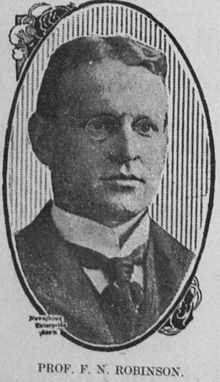Fred Norris Robinson

Fred Norris Robinson (April 4, 1871 – July 21, 1966) was an eminent American Chaucer scholar and Celticist.
Biography
Norris received his B.A. (1891), M.A. (1892), and PhD (1894) from Harvard University, working with the eminent medievalists Francis James Child and George Lyman Kittredge. In 1936, after appointments at Harvard as instructor (1894), assistant professor (1902), and professor (1906), he succeeded his thesis adviser, Kittredge, as Gurney Professor of English. In 1895, he spent a year abroad at the University of Freiburg, Germany, working with Rudolph Turneysen, one of the founders of Celtic Philology.
Scholarly achievements
Norris' main scholarly achievement was the publication, after 29 years of preparatory work, of the most influential edition of The Works of Geoffrey Chaucer (1933; second edition 1957 published under slightly different titles). The 1987 Riverside Chaucer, while revised and re-edited by several colleagues, is greatly indebted to his work. These three editions have facilitated more students' first contact with the medieval author than any others. Moreover, his work as editor contributed to the move of Chaucer studies from Europe to North America.
The other major success in Norris' career is that he became the founding father of Celtic Studies in the United States. "He taught the first course in Gaelic in the US, and because of his collection building with Irish language and literature, Welsh, Scottish Gaelic, Cornish, Breton, and Manx books, Harvard's Widener Library has the finest collection of works in the field of Celtic Studies in the world."[1]
Select publications
- The Complete Works of Geoffrey Chaucer, ed. F.N. Robinson (Boston and New York: Houghton Mifflin; Oxford: Oxford University Press, 1933).
- The Works of Geoffrey Chaucer, ed. F.N. Robinson (Boston: Houghton Mifflin, 1957).
Literature
- Daniel Donoghue, “The History of English Medieval Studies at Harvard University,” Medieval English Newsletter 28 (June 1993): 1–3.
- Richard Utz, “The Colony Writes Back: F.N. Robinson’s Complete Works of Geoffrey Chaucer (1933) and the Translatio of Chaucer Studies to the United States.” Studies in Medievalism 19 (2010): 160-203.
References
- ↑ Anita Obermeier, "Robinson, Fred Norris," Handbook of Medieval Studies, ed. Albrecht Classen (Berlin: de Gruyter, 2010), pp. 2594-99 (here 2594).
External links
| Wikisource has original works written by or about: Fred Norris Robinson |